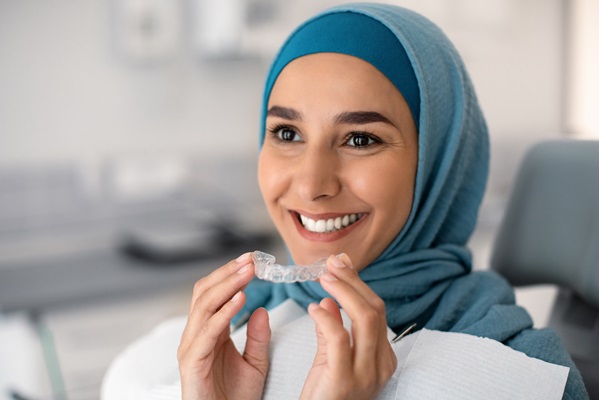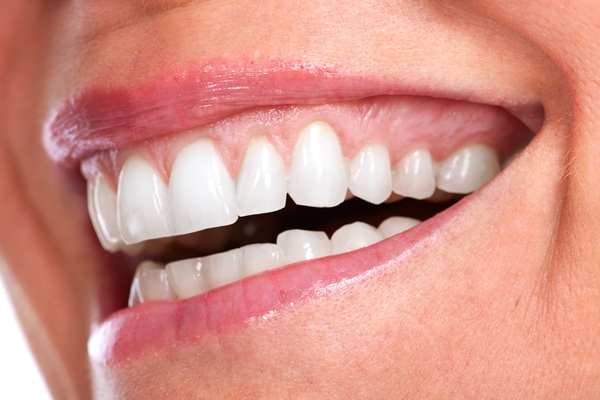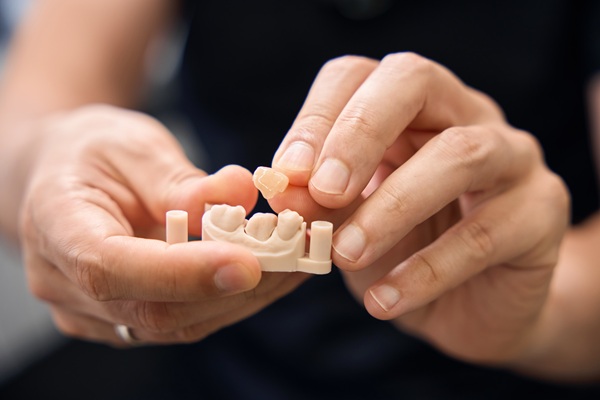Invisalign Teeth Straightening Therapy Aftercare

Invisalign® is a great treatment method to undergo when needing to straighten crooked teeth or correct bite issues. However, life after Invisalign® is what excites most people! What is important to know is that afterward, it is crucial to abide by a few things in order to maintain the results that come from the treatment. Continue reading to find out more about retainers and aftercare tips from a general dentist.
Life after Invisalign®
Below is a quick overview of what to expect after Invisalign® treatment is complete. This information may be helpful to individuals who are preparing to finish their treatment process.
Retainers
As soon as Invisalign® treatment is complete, most general dentists will recommend the use of a retainer. Retainers help to keep the teeth in the proper position, thus maintaining the results that came from the treatment process. Just like with the aligners, retainers too are custom-created to fit the patient's upper and/or lower arch.
Retainers are typically offered in two different ways. The most common type of retainer to follow Invisalign® treatment is one that is removable and only worn at night while the patient is asleep. This type of retainer has a small metal bar that goes directly over the teeth. A small piece usually sits in the middle for stability. Although this type of retainer is most common, it is not always the most efficient. Because it is removable, patients often forget to wear it or become less disciplined with it. Long term, this can have an effect on the teeth. The teeth can eventually shift back into the position they were in prior to Invisalign® treatment.
The other type of retainer that may be recommended after Invisalign® treatment is one that is cemented into place permanently. The general dentist will still have the piece custom-made; however, it will literally be attached to the backside of the teeth. It is not removable unless by a dentist and allows for the maintenance of permanent results.
Oral hygiene
After any type of dental work, good oral hygiene is necessary. However, with Invisalign®, it is especially important because the teeth have shifted into their proper position. This means that old spaces or gaps may be closed, and the teeth may require different attention. It is crucial that proper flossing and brushing is done each day as this will help ensure that the teeth remain in great shape, making the most of the results from Invisalign®.
General dentists recommend brushing twice a day or after every meal with a soft to medium bristled toothbrush. Additionally, flossing and rinsing at least once a day will help keep the gums in healthy shape.
Find out more about Invisalign®
When considering Invisalign®, it is a good idea to also have an understanding of the aftercare, as stated above. For further inquiries about the treatment process and life afterward, it is best to consult directly with a general dentist. To learn more or to get scheduled for an appointment, reach out today.
Request an appointment here: http://villagecenterdentistry.com or call Village Center Dentistry at (281) 644-0134 for an appointment in our Katy office.
Check out what others are saying about our dental services on Yelp: Invisalign in Katy, TX.
Related Posts
Dental veneers create a brighter, more uniform smile and often help correct cosmetic concerns that make teeth look uneven or worn. Many patients want improvements that look natural while still enhancing confidence in everyday settings. Veneers offer a versatile option for refining color, shape, and symmetry in some cases without extensive orthodontic treatment. A dentist…
An implant crown is made of strong and safe materials to give the patient a reliable long-term replacement option for missing teeth. If you have questions about the materials used to make an implant crown, this review can help you understand what exactly each component is made of and why dentists use these particular materials.There…
Denture repair is a common need for patients who wear partial or full dentures. While these oral appliances are strong, they are prone to breaking because of their delicacy. When a break occurs, it can be hard to know whether a denture repair can take place or if a complete replacement is necessary. Thankfully, patients…
A dental crown is a long-lasting dental restoration that helps restore the strength, appearance, and function of a severely damaged tooth. While these restorations are strong, proper dental crown care ensures their durability and prevents potential complications. The following guidelines can help you preserve your newly restored tooth and maintain your long-term oral health.A dental…


